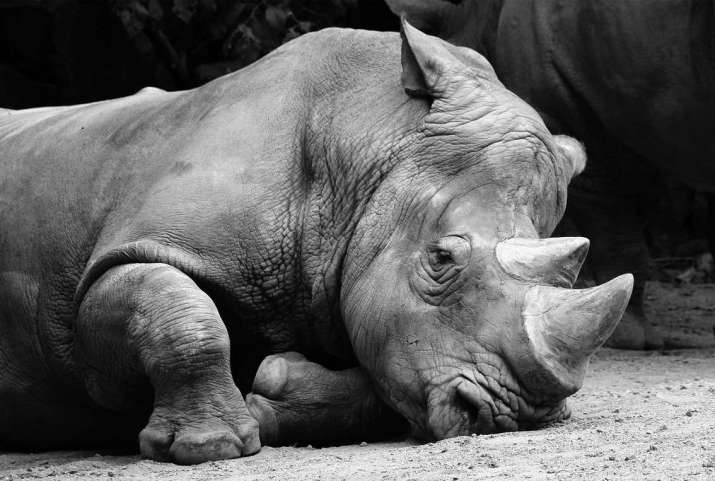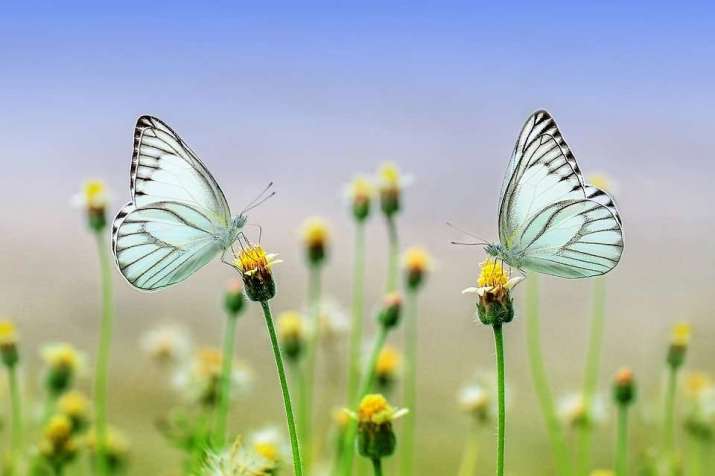FEATURES|COLUMNS|Academic Reflections
The Butterfly and the Rhinoceros

For most of my adult life, I have wanted one thing: to become the rhinoceros.
The rhinoceros is a person who does not need to speak. The rhinoceros is a person who is comfortable walking slowly by themselves, who can watch time pass with ease. A person who enjoys the sunset or a cup of tea without distraction. Someone who does not seek others to feel complete.
In the Sutta Nipata, the Buddha tells his audience that a monk should be like the rhinoceros —wandering solitary and alone. The social person, by contrast, is smitten by the world. And that leads to suffering, because the world will disappoint. One should therefore wander solitary and alone. When one is surrounded by friends, one invariably becomes “prey to their requests.” Instead, we should wander like a rhinoceros. Solitary and alone.
I have carried this image in my mind for many years. I am a natural extrovert, drawn to the company of others, to their friendship and their presence. I talk with enthusiasm (almost always using my hands) and engage with the world wherever I go. I am far from the idealized monk of the Sutta Nipata. I am almost never wandering solitary and alone. If I happen to be solitary and alone, it won’t take long before I make a new friend to keep me company. It can be charming or annoying, but either way, it is just how I go.
But then there was COVID-19, and my reality was forced to change.
Now, I am often solitary and alone. And I realize, for the 108th time, that I am not well-suited to the life of a rhinoceros. I am a happy butterfly (which is what my name, Vanessa Sasson, in fact means). I was made to float over flowers and enjoy their beauty. I was not made for the life of a monk. And yet here I am, more alone than I have ever been. Strangely, still pining for the life of the rhinoceros even though I know it is not what I am meant to be.
I know, of course, that monastics do not always (or even very often) live the life of a rhinoceros either. Most monastics live in a community, surrounded by others. They work hard, care for the grounds, care for each other, and meet with laypeople almost constantly. Monastics are almost never alone. When the Buddha praised the one who wanders solitary and alone, he was not talking about most monastics I have come to know. Why then, do I feel so bad about failing as a rhinoceros?
There are a few answers to this question.
First and most important: COVID-aloneness is not quite what the Sutta Nipata was talking about. COVID-aloneness is an imposition. That is not the same thing.
COVID-aloneness is, moreover, the product of significant collective trauma. None of us has ever experienced anything like this before. We have our own individual sufferings, but to share economic, social, and personal tragedy on such a global scale is unprecedented. We are alone right now because to be together is to risk each other’s safety. No one wants aloneness like this. I feel bad because all of this simply does feel bad. This aloneness was not something I was aspiring toward.
But there is another answer to this question, and one of which I must continually remind myself. The answer (so the text tells us) goes like this:
Don’t take as a friend
someone heedless & hankering.
wander alone
like a rhinoceros.
Consort with one who is learned,
who maintains the Dhamma,
a great & quick-witted friend.*
The sutta insists that wandering alone like a rhinoceros is the path to wisdom. Over and over, the text tells us that it is better this way, free from longing, abandoning fetters, shattering attachments. This is the Buddhist ideal.
But what is often overlooked is that the text also states that one must consort with good friends and abandon the heedless and hankering. The ideal monastic might need to wander alone, but she might also rely on a good friend. One who maintains truth (Dhamma) and who is quick-witted. If she finds a companion who is mature, right-living, and wise, she should travel with that friend, because this text “praises companionship.” It must be companionship of the right kind, but real companionship merits praise.

COVID-aloneness can feel like solitary confinement at times. This is not what the Sutta Nipata had in mind. The text never states that aloneness must be imposed on others so that they might learn. No one is told to lock themselves up. The aloneness of this text is not an act of violent barricade. It is a choice, pursued (ideally) out of love and hope. And it can be performed with good friends beside you—if you are so fortunate as to find them. The rhinoceros might wander solitary and alone most of the time, but it can also walk with others.
I am not likely to ever be much of a rhinoceros in this life. I am learning to embrace the butterfly that is my name. My aloneness usually does not last long if I can help it. I make a friend and enjoy what they have to say. Probably not what the text was suggesting (it had higher aspirations where companionship was concerned), but the text was not addressing butterflies. It was focused on a different personality type.
But even if we are not all butterflies, even if we are natural rhinos, COVID-aloneness was never the goal. Here in Canada, winter is fast approaching and this has many of us worried. The aloneness will deepen as the second wave of the pandemic takes over and the snow closes in. Specialists are increasingly warning us about the deleterious effects that another lockdown is certain to have on our communities, yet lockdowns are nevertheless probably on their way. The personal cost will be devastating for many of us. Rhinos and butterflies alike.
This passage in the Sutta Nipata is powerful and it has been circling Buddhist spaces for centuries. It is a call to find our inner quiet, to depend on ourselves, to give up empty distractions and focus on higher hopes. But it is not a call to imprisonment. It is a call for substance, and there is a world of difference in that.
No one does well with imposed isolation. No one likes being forced to shut themselves in. We might choose solitude for ourselves at some points in our lives, but none of us likes the sound of locks sliding into place on the other side of the door.
So to the rhinos and the butterflies and everyone in between, let us take our cues from this text and wander solitary and alone (as we are forced to do), but let us also praise companionship and honor it wherever it might be found.
* Translation from Access to Insight: https://www.accesstoinsight.org/tipitaka/kn/snp/snp.1.03.than.html
Related features from Buddhistdoor Global
At the Dog Park: Rejoicing in our Common Roots of Good and Evil
Buddhistdoor View: Discovering Oneself in Woodland Solitude
Buddhistdoor View: Loneliness as a Spiritual Concern and Ailment
Venerable Hāsapañña: Finding Contentment in Solitude














